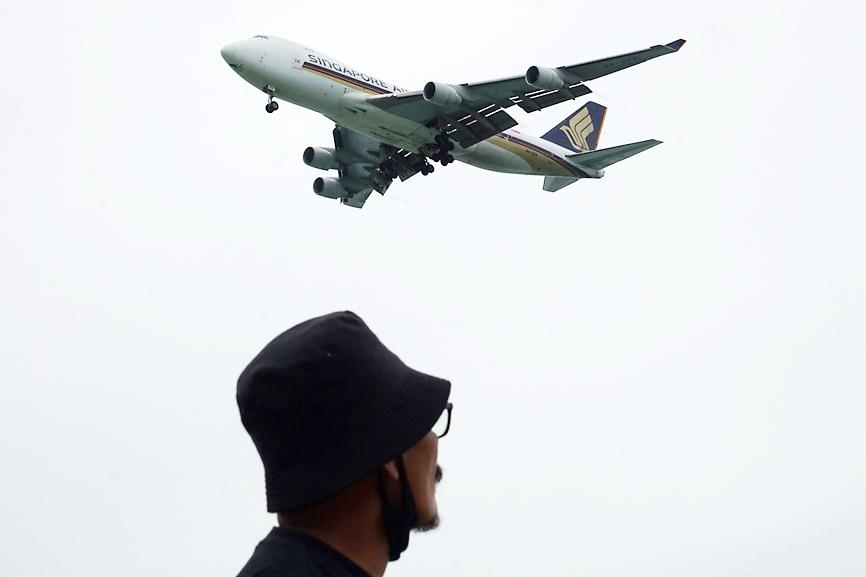Hong Kong and Singapore plan to start an air travel bubble that would replace quarantine with COVID-19 testing from Sunday next week, officials said in separate media briefings yesterday.
There are to be several flights a week on Singapore Airlines and Cathay Pacific Airways from that date, rising to daily from Dec. 7. A maximum of 200 people are to be permitted on each flight.
Details of the arrangement, released nearly a month after the two Asian hubs first announced that they would reopen their borders to one another, would be reviewed after one month.

Photo: AFP
Singaporean Minister for Transport Ong Ye Kung (王乙康) told a news briefing that this was the first travel bubble of its type and might be used as a template for other countries, if successful.
The travel bubble would help to ensure a brighter future for the city-state’s Changi Airport and Singapore Airlines, he said.
Travel bubbles are seen as key to reopening borders ahead of the introduction of an effective and internationally recognized vaccine.
Yet they have been hard to put into practice, as COVID-19 continues to spread or flare again in much of the world.
Cases globally have surpassed 51 million, while deaths are nearing 1.3 million.
Even the Singapore-Hong Kong arrangement comes with a long list of requirements and some restrictions.
The waiting time for a COVID-19 test would likely be about four hours and fares would be a commercial decision for the two airlines, Ong said.
“I suspect travelers might well be quite careful in the beginning before they gradually become more confident,” Ong said. “I suspect that many Singaporeans and Hong Kongers will take a wait-and-see attitude until after a while you can do one test less perhaps.”
Flying in the travel bubble would also require a degree of paperwork.
Tests should be taken within 72 hours prior to departure and applications for travel approval should be done online at least seven days ahead of time.
Should travelers test positive for the virus in Singapore or Hong Kong, they would need to bear the full cost of any medical treatment provided to them.
Travelers must also have been in Hong Kong or Singapore for 14 days before departure.
Having brought their COVID-19 outbreaks largely under control, Hong Kong and Singapore are eager to prize open their borders and get their economies ticking back to life again.
Hong Kong’s total reported infections stand at 5,389, while Singapore’s tally is just more than 58,000.
That contrasts with many nations in Europe, as well as the US, which is reporting more than 100,000 cases a day.
“Both Singapore and Hong Kong rely a lot on the success of the airlines and airports for their economies,” said Shukor Yusof, founder of aviation consulting firm Endau Analytics.
Ticket prices have risen in anticipation of the Hong Kong-Singapore bubble.
The lowest fares on Singapore Airlines economy class rose to S$678 (US$503) for return flights next month, up from S$557 earlier this month, the carrier’s Web site showed.

POLITICAL PRISONERS VS DEPORTEES: Venezuela’s prosecutor’s office slammed the call by El Salvador’s leader, accusing him of crimes against humanity Salvadoran President Nayib Bukele on Sunday proposed carrying out a prisoner swap with Venezuela, suggesting he would exchange Venezuelan deportees from the US his government has kept imprisoned for what he called “political prisoners” in Venezuela. In a post on X, directed at Venezuelan President Nicolas Maduro, Bukele listed off a number of family members of high-level opposition figures in Venezuela, journalists and activists detained during the South American government’s electoral crackdown last year. “The only reason they are imprisoned is for having opposed you and your electoral fraud,” he wrote to Maduro. “However, I want to propose a humanitarian agreement that

ECONOMIC WORRIES: The ruling PAP faces voters amid concerns that the city-state faces the possibility of a recession and job losses amid Washington’s tariffs Singapore yesterday finalized contestants for its general election on Saturday next week, with the ruling People’s Action Party (PAP) fielding 32 new candidates in the biggest refresh of the party that has ruled the city-state since independence in 1965. The move follows a pledge by Singaporean Prime Minister Lawrence Wong (黃循財), who took office last year and assumed the PAP leadership, to “bring in new blood, new ideas and new energy” to steer the country of 6 million people. His latest shake-up beats that of predecessors Lee Hsien Loong (李顯龍) and Goh Chok Tong (吳作棟), who replaced 24 and 11 politicians respectively

Young women standing idly around a park in Tokyo’s west suggest that a giant statue of Godzilla is not the only attraction for a record number of foreign tourists. Their faces lit by the cold glow of their phones, the women lining Okubo Park are evidence that sex tourism has developed as a dark flipside to the bustling Kabukicho nightlife district. Increasing numbers of foreign men are flocking to the area after seeing videos on social media. One of the women said that the area near Kabukicho, where Godzilla rumbles and belches smoke atop a cinema, has become a “real

‘WATER WARFARE’: A Pakistani official called India’s suspension of a 65-year-old treaty on the sharing of waters from the Indus River ‘a cowardly, illegal move’ Pakistan yesterday canceled visas for Indian nationals, closed its airspace for all Indian-owned or operated airlines, and suspended all trade with India, including to and from any third country. The retaliatory measures follow India’s decision to suspend visas for Pakistani nationals in the aftermath of a deadly attack by shooters in Kashmir that killed 26 people, mostly tourists. The rare attack on civilians shocked and outraged India and prompted calls for action against their country’s archenemy, Pakistan. New Delhi did not publicly produce evidence connecting the attack to its neighbor, but said it had “cross-border” links to Pakistan. Pakistan denied any connection to